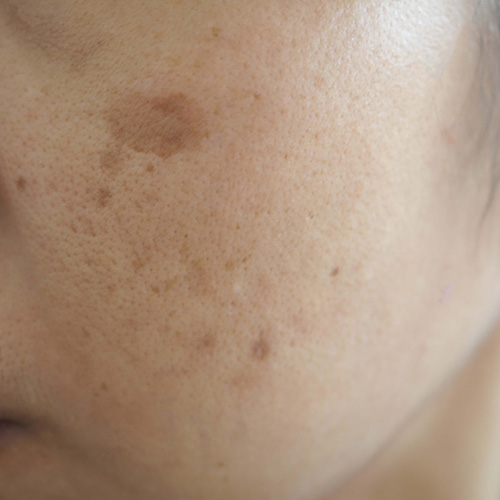Melasma is a common skin condition that is characterized as brown or gray irregular patches on the skin, caused by an overproduction of pigment in the skin cells. Melasma can be stubborn to treat, but with the right approach with our SKIN team, the condition can be taken care of and the quality of life improved.
Melasma is one of the most commonly seen hyperpigmentation disorders, with almost 90% affected being women, especially those with darker skin. It’s most commonly found on the face and shows up as dark patches/spots with irregular borders. There is no known cause of melasma, but it has been linked to oral contraceptives, pregnancy, allergic reactions to cosmeceuticals or medications, sunlight, and genetic predisposition.

+ Complimentary Skin Consultation
+ Melasma treatment with medication (referral required)
+ PRP
+ ResurFX
+ SPF
+ Monthly or quarterly at home skin examinations
Although it’s not possible to completely prevent Melasma, avoiding sun exposure whenever possible and wearing broad-spectrum SPF will offer protection to the pigment producing cells.
It can. For many individuals, Melasma is a chronic disorder that they are dealing with long-term, where as in others it may dissipate after a flare or a period of time.
Melasma is present in 15-50% of people who are pregnant. Increased levels of estrogen, progesterone, and melanocyte-stimulating hormone causes increased activity of melanocytes, which are the cells that produce pigment in our skin. It typically appears in the second or third trimester of pregnancy.
No – this hyperpigmentation disorder does not increase the risk of skin cancer. Sometimes skin cancer may mimic melasma, so it is best to be assessed by a provider to rule out a diagnosis.
Unfortunately there is no one cure at this time, and Melasma can be hard to treat. Determining and eliminating the cause of the Melasma will greatly improve treatment outcomes. There are a variety of topicals and procedures available that will help improve the appearance of melasma.
Every patient is different, but the most common irritants for Melasma include hormonal treatments, sun/heat exposure, irritating cosmetics and skincare, heavily scented soaps, and waxing the skin.
PRODUCT RECOMMENDATIONS
&
Follow our socials to stay up-to-date.